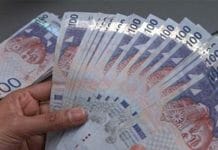Asian stocks are poised for a broadly mixed open in the wake of reinforced bets of Federal Reserve rate cuts and Taiwan’s election at the weekend.
Equity futures in Australia and Hong Kong pointed to an early rise when trading begins while contracts in Japan fell. The S&P 500 was little changed Friday, notching a weekly gain after US producer prices unexpectedly declined, solidifying bets of a March Fed rate cut.
Traders will be monitoring Taiwan assets after the Democratic Progressive Party won the presidential election and the more China-friendly Kuomintang gained too few seats to control the assembly. China has so far had a muted response to the weekend’s results, while DPP’s loss of majority in the legislature increases the prospect of major parties having to cooperate on policy.
With the result largely in line with opinion polls prior to the vote, “we expect minimal reaction by global financial markets to the election result,” Commonwealth Bank of Australia strategists led by Joseph Capurso wrote in a note to clients.
The steady start in Asia comes as a gauge of global equities has gotten off to a rocky start this year after last quarter’s 11% rally — the biggest gain in three years — amid euphoria over AI and bets the global rate hiking cycle is done. Chinese shares however have slumped with consumer spending, while those in Japan hit their highest since 1990 last week as decades-long deflation fades and a weak yen supports exporter earnings.
“I look for a pause/pullback from here,” Rick Bensignor, president of Bensignor Investment Strategies and a former strategist at Morgan Stanley, said of Japanese stocks in a note. “But this long overlooked market woke up a year ago, and it continues to be a place you need have money in.”
Producer Prices Fall
Meantime, bond markets have been whipsawed as key inflation and jobs data paints a mixed picture on the US economy. Treasuries rallied on Friday after the US producer price index for final demand fell for a third straight month. Swaps traders see an almost 80% chance of Fed’s easing cycle will start March, up from about 62% earlier last week, according to data compiled by Bloomberg.
The market is pricing almost 170 basis points in rate cuts this year which “continues to strike us as unreasonably aggressive, especially as the real sector data may show the US economy continued to grow above the 1.8% pace in Q4 23, which the Fed estimates is the non-inflationary speed limit,” said Marc Chandler, chief market strategist at Bannockburn Global Forex. “The real sector data in the coming days may encourage some paring back of the aggressive wagers.”
After the big fourth-quarter rally, investors are shifting gears to what companies have to show for it in their earnings scorecards. Wall Street’s biggest banks on Friday took turns calling an end to the record run for their biggest source of revenue. Wells Fargo & Co. surprised analysts by predicting a 9% drop in net interest income for 2024, while Citigroup Inc. forecast a modest drop this year. Even JPMorgan Chase & Co., which sees its 2024 haul holding up at 2023 levels, predicts it will drop off over the course of the year.
Along with more US earnings reports, investors this week will be focused on inflation readings in Germany and the UK, as well as a swath of political leaders and officials including Chinese Premier Li Qiang attending the annual World Economic Forum at Davos, Switzerland. A speech by Federal Reserve Governor Chris Waller, after officials last week attempted to temper any expectation of a looming rate cut, will also be closely watched.
“Fed Governor Waller gave an early and strong sign in October that the Fed could stop hiking rates and consider a pivot,” Stephen Gallagher, an economist at Societe General wrote in a note to clients. “We will be watching closely for any pushback on expectations in the financial markets for a March rate cut.”
Elsewhere, oil and gold rose on Friday as the US and its allies launched airstrikes against Houthi rebels in Yemen. – Bloomberg









